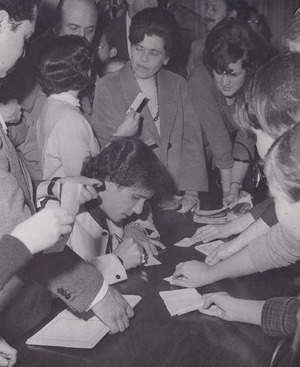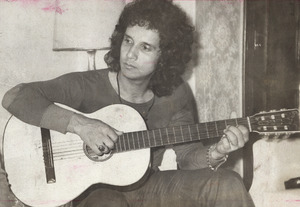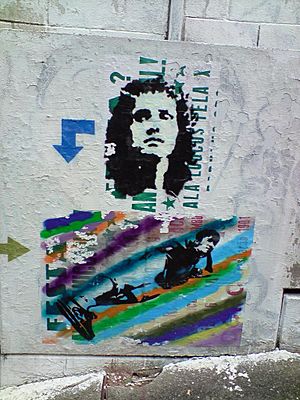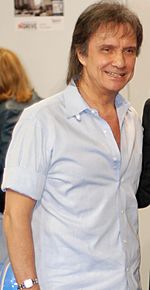Roberto Carlos (singer) facts for kids
Quick facts for kids
Roberto Carlos
|
|
|---|---|
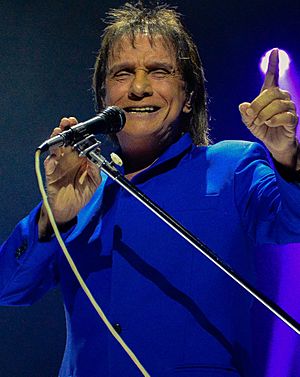
Roberto Carlos in 2018
|
|
| Background information | |
| Birth name | Roberto Carlos Braga |
| Born | 19 April 1941 |
| Origin | Cachoeiro de Itapemirim, Espírito Santo, Brazil |
| Genres | Jovem Guarda, MPB |
| Occupation(s) |
|
| Instruments |
|
| Years active | 1951–present |
Roberto Carlos Braga, born on April 19, 1941, is a famous Brazilian singer and songwriter. Many people call him "King of Latin Music" or simply "the King." He wrote most of his songs with his good friend, Erasmo Carlos. Roberto Carlos has sold over 140 million albums around the world. This makes him the best-selling Latin American music artist ever. He is seen as a very important artist in Brazil. Many other musicians look up to him.
Contents
Early Life and First Steps in Music
Roberto Carlos Braga was born in Cachoeiro de Itapemirim, a town in the southern part of Brazil's Espírito Santo state. He was the youngest of four children. His father, Robertino Braga, was a watchmaker, and his mother, Laura Moreira Braga, was a seamstress. Their family lived in a simple home. When Roberto was six years old, he had an accident with a train. He had to have part of his right leg removed. He uses a special leg (a prosthesis) but prefers not to talk about the accident.
As a child, Roberto learned to play the guitar and piano. His mother taught him first, and then he studied at the Itapemirim Music Conservatory. When he was nine, he sang for the first time on a children's radio show. He sang a song called "Mal Amor" and won candies as his prize. He later said he was "very nervous, yet very happy." He became a regular singer on that show.
A Star's Journey
Starting with Rock and Roll
Roberto Carlos loved Elvis Presley and the rock music of the 1950s. In 1957, he formed a singing group called The Sputniks with friends like Tim Maia. The group later broke up. In the 1960s, Roberto Carlos became famous for a music style called Jovem Guarda, which means "Young Guard." This was Brazil's first big pop rock movement. Because of this, people started calling Roberto Carlos "O Rei," which means "The King."
His first single and album, Louco por você (1961), did not sell well. But Roberto Carlos kept going. In 1962, he released Splish Splash. He and his friend Erasmo Carlos wrote their own songs and made Portuguese versions of popular songs. Their song "Parei Na Contramão" became a big hit. The next year, his album É Proibido Fumar was also very popular. This led to the famous Jovem Guarda TV show.
The Jovem Guarda TV Show
In 1965, Roberto Carlos started hosting the Jovem Guarda TV show on TV Record. He hosted it with Erasmo Carlos and Wanderléa. This show made pop rock even more popular in Brazil. It also made Roberto Carlos a huge star for young people. That same year, he released two successful albums: Roberto Carlos Canta Para A Juventude and Jovem Guarda. These albums had many hits, including "Quero Que Vá Tudo Pro Inferno."
In 1966, Roberto Carlos and Erasmo Carlos had a disagreement. This almost ended their songwriting partnership. The problem was about who got credit for their songs on a TV show. They stopped working together for over a year. During this time, Roberto wrote songs like "Namoradinha de Um Amigo Meu." Their friendship and partnership started again when Erasmo helped Roberto finish the lyrics for "Eu Sou Terrível."
Movies and International Fame
In 1967, Roberto Carlos starred in his first movie, Roberto Carlos em Ritmo de Aventura. It was a big hit in Brazilian cinemas. He also started performing outside Brazil, including in France. In 1968, he released the album O Inimitável. This album showed new influences from American soul and funk music. It included popular songs like "Se Você Pensa" and "Eu Te Amo, Te Amo, Te Amo." Later that year, Roberto Carlos became the first and only Brazilian to win the Festival of San Remo in Italy.
In 1969, Roberto Carlos's music became more romantic. His album Roberto Carlos featured hits like "As Curvas da Estrada De Santos" and "Sua Estupidez." He also starred in his second movie, Roberto Carlos e o Diamante Cor-de-rosa, which was another box office success.
The 1970s and 1980s: A Global Star
The 1970s saw Roberto Carlos become a top romantic artist in Brazil and around the world. He sold the most albums in Brazil. Many of his songs were recorded by other famous artists. In 1970, he released his yearly album, which included the hit "Jesus Cristo." This song showed his growing interest in religion.
In 1971, his last movie, Roberto Carlos a 300 km Por Hora, was released and was very popular. His album that year had hits like "Detalhes" and "Amada Amante." In 1972, his album was the first to sell over one million copies. It featured songs like "A Montanha." Since 1974, TV Globo has aired a special show with Roberto Carlos at the end of each year. This show became a Brazilian tradition.
Roberto Carlos continued to release popular albums throughout the 1970s and 1980s. His 1977 album included "Amigo," a song dedicated to Erasmo Carlos, and "Lady Laura," a song for his mother. This album sold 1.5 million copies. His concerts were also very popular, always selling out. In 1979, when Pope John Paul II visited Mexico, a children's choir sang Roberto's song "Amigo" to greet him. This was seen by millions worldwide.
In the 1980s, Roberto Carlos started recording albums in English, French, Spanish, and Italian. He won the Globo de Cristal award for selling over five million copies outside Brazil. His songs continued to break records in Brazil. In 1985, he joined other famous singers like Julio Iglesias and Gloria Estefan to sing "Cantarê, cantarás" to help children in Latin America. In 1988, he won a Grammy Award for Best Latin Pop Album.
The 1990s and 2000s: Enduring Legacy
Roberto Carlos kept recording romantic songs in the 1990s. In 1992, he got his name on the Latin artist Walk of Fame in Miami. By 1994, he had sold over 70 million records in Latin America. In 1996, he had another hit with Erasmo Carlos, "Mulher de 40." He also sang "Puedes Llegar" with other stars for the Atlanta Olympics.
In 2001, Roberto Carlos ended his contract with Sony, his long-time record company. In 2004, he received the Latin Grammy Lifetime Achievement Award. He was also named Latin Recording Academy Person of the Year in 2015. In 2006, he released "Duetos," a CD and DVD featuring special moments from his TV shows.
Every year, Roberto Carlos hosts a special TV show where he sings his greatest hits with guest stars. This show is a beloved tradition in Brazil. The house where he was born has even been turned into a museum about him. In 2008, Roberto Carlos performed a show with Caetano Veloso to honor Antonio Carlos Jobim. In 2009, he started a tour to celebrate 50 years of his career. His first concert was in his hometown on his 68th birthday.
2010s to Present: Continuing to Inspire
Roberto Carlos's mother, Laura Moreira Braga, passed away in April 2010. This news came just after his concert in New York City. Throughout the 2010s, Roberto Carlos continued his popular cruise ship concert project, "Emoções em Alto Mar" (Emotions in the High Seas). In 2011, he also held a concert in Jerusalem.
In 2011, the Beija-Flor samba school honored Roberto Carlos in the Rio Carnival parade. In 2013, his song "Esse Cara Sou Eu" won the Latin Grammy Award for Best Brazilian Song. He also received the Billboard Latin Music Lifetime Achievement Award in 2015 and the Lo Nuestro Excellence Award in 2019.
Celebrating 50 Years of Music
On July 11, 2009, Roberto Carlos held a huge concert at Maracanã Stadium to celebrate 50 years of his career. It was his first time performing in that stadium, and about 70,000 people came to watch.
His 50th career anniversary was also celebrated with a big exhibition in Ibirapuera Park, São Paulo. This interactive exhibit, which opened in March 2010, showed his life and career. Many young artists say Roberto Carlos's music taught them that "poetry has to be sweet, pure, direct, and lively."
Discography
Roberto Carlos has released many albums, mostly in Portuguese, but also some songs in Spanish, English, and Italian. Many of his albums are simply self-titled, so a famous song from each is often used to identify them.
- 1961 - Louco Por Você
- 1963 - Splish Splash
- 1964 - É Proibido Fumar
- 1965 - Canta Para a Juventude
- 1965 - Canta a la Juventud
- 1965 - Jovem Guarda
- 1966 - Roberto Carlos ("Eu Te Darei O Céu")
- 1967 - Roberto Carlos em Ritmo de Aventura
- 1968 - O Inimitável
- 1969 - Roberto Carlos ("As Flores do Jardim da Nossa casa")
- 1970 - Roberto Carlos ("Ana")
- 1971 - Roberto Carlos ("Detalhes")
- 1972 - Roberto Carlos ("A Janela")
- 1972 - Un gato en la oscuridad
- 1973 - Roberto Carlos ("A Cigana")
- 1973 - En español ("La distancia")
- 1974 - Roberto Carlos ("Despedida")
- 1974 - El día que me quieras
- 1975 - Roberto Carlos ("Quero Que Va Tudo Pro Inferno")
- 1975 - Quiero verte a mi lado
- 1976 - Roberto Carlos ("Ilegal, Imoral ou Engorda")
- 1976 - San Remo 1968
- 1976 - Tu cuerpo
- 1977 - Roberto Carlos ("Amigo")
- 1977 - En español ("El progreso")
- 1978 - Roberto Carlos ("Fé")
- 1978 - Roberto Carlos ("Amigo (en español)")
- 1979 - Roberto Carlos ("Meu Querido, Meu Velho, Meu Amigo")
- 1979 - Roberto Carlos ("Fé (en español)")
- 1980 - Roberto Carlos ("A guerra dos meninos")
- 1980 - Mi querido, mi viejo, mi amigo
- 1981 - Roberto Carlos ("Ele está prá chegar")
- 1981 - La guerra de los niños
- 1982 - Roberto Carlos ("Amiga")
- 1982 - Roberto Carlos ("Emociones")
- 1983 - Roberto Carlos ("O Amor é a Moda")
- 1983 - Roberto Carlos ("Amiga (en español)")
- 1984 - Roberto Carlos ("Coração")
- 1984 - Roberto Carlos ("El amor y la moda")
- 1985 - Roberto Carlos ("Verde e Amarelo")
- 1985 - Roberto Carlos '85 ("Corazón")
- 1986 - Roberto Carlos ("Apocalipse")
- 1986 - Roberto Carlos '86 ("De corazón a corazón")
- 1987 - Roberto Carlos ("Tô chutando lata")
- 1987 - Nuestro amor
- 1988 - Roberto Carlos ("Se Diverte e Já Não Pensa em Mim")
- 1988 - Ao Vivo (live recording)
- 1988 - Volver
- 1989 - Roberto Carlos ("Amazônia")
- 1989 - Sonrie
- 1990 - Roberto Carlos ("Super herói")
- 1990 - Pajaro herido
- 1991 - Roberto Carlos ("Todas As Manhãs")
- 1991 - Roberto Carlos ("Súper héroe")
- 1992 - Roberto Carlos ("Você É Minha")
- 1993 - Roberto Carlos ("O Velho Caminhoneiro")
- 1993 - Roberto Carlos ("Mujer pequeña")
- 1994 - Roberto Carlos ("Alô")
- 1995 - Roberto Carlos ("Amigo Não Chore Por Ela")
- 1996 - Roberto Carlos ("Mulher de 40")
- 1997 - Canciones Que Amo
- 1998 - Roberto Carlos ("Meu Menino Jesus")
- 1999 - 30 Grandes Sucessos (Greatest Hits)
- 2000 - Mensagens
- 2000 - Amor Sem Limites
- 2000 - Grandes Canciones (2 CD's)
- 2001 - Acústico MTV (MTV Unplugged)
- 2002 - Ao Vivo (Live)
- 2003 - Pra Sempre
- 2004 - Pra Sempre Ao Vivo No Pacaembu (Live)
- 2004 - Mensajes de Fe
- 2005 - Roberto Carlos ("Promessa")
- 2006 - Duetos
- 2008 - En Vivo (Live in Spanish)
- 2008 - Roberto Carlos e Caetano Veloso e a música de Tom Jobim
- 2009 - Elas Cantam Roberto Carlos
- 2010 - Emoções Sertanejas
- 2011 - Projeto Emoções em Jerusalém (Live)
- 2012 - Esse Cara Sou Eu
- 2013 - Roberto Carlos Remixed
- 2014 - Duetos 2
- 2014 - Ese Tipo Soy Yo
- 2015 - Roberto Carlos em Las Vegas
- 2015 - Primera Fila (Live)
- 2017 - Roberto Carlos ("Chegaste")
- 2018 - Amor Sin Limite
Filmography
Feature Films
- 1968 – Em Ritmo de Aventura
- 1970 – O Diamante Cor De Rosa
- 1971 – A 300 km Por Hora
Live Concert Films
- 2001 – Acústico MTV
- 2001 – Acústico Gold Serie Limitada
- 2004 – Pra Sempre Ao Vivo no Pacaembu
- 2006 – Antologia (CD + DVD)
- 2006 – Duetos
- 2008 – Roberto Carlos ao Vivo (CD + DVD)
See also
 In Spanish: Roberto Carlos (cantante) para niños
In Spanish: Roberto Carlos (cantante) para niños
- Getúlio Côrtes
- List of best-selling Latin music artists
- List of best-selling music artists
 | Anna J. Cooper |
 | Mary McLeod Bethune |
 | Lillie Mae Bradford |


